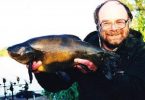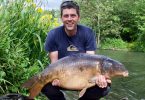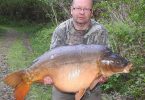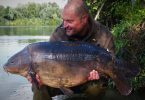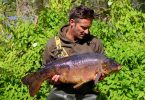Do It Yourself Surgery
One of the other waters we fished while fishing Johns’ lake was Griffins Lake near Canterbury. We started fishing it in November, which is not a good time to start on a water, but we don’t always do sensible things, do we? On our fist session Clive and I went to the lake early on a Saturday morning and set up on a gravel island, which overlooked the house bay. Clive was going to use a protein bait fished over maggots and hemp, I was experimenting with a new type of bait. I wish I was of a nature where I could just go fishing with the tried and trusted, but I can’t. Sometimes the experimenting has caught me a lot of nice fish but at other times I have spent several sessions adjusting a new rig or making alterations to a bait and have caught very little in the process. We had been set up about two hours, Clive fishing to the right and myself to the left, when John arrived carrying his rod holdall; his mother was a few steps behind him carrying the rest of his tackle. The walk from the car park was about half a mile and John clearly wanted to keep himself fresh for the session ahead. He decided to set up behind us and cast to the big island, Clive gave me a knowing grin, there was no more than two feet of water in front of John.
The day would have passed slowly if Clive and I hadn’t decided to try fishing with fresh water mussels, after collecting half a dozen of them we set about opening them. Now I know that you are supposed to slice the hinge of their shells with a sharp knife but in the cold air their shells were starting to open so I tried to pull one open. The shell shattered and a bit of shrapnel cut the end of one of my fingers off. It was only held on by a sliver of skin and as it flapped about you could see the inside of my fingernail, it was a mess and was bleeding profusely. Neither Clive nor John were able to drive at the time and between us we couldn’t stop it bleeding, I didn’t really want to phone for an ambulance and tell them that I had cut my finger. So with two cans of lager for anaesthetic and a needle sterilised in a lighter flame we sewed it back on. I pulled the needle through the skin and Clive tied the knots in the nylon whipping thread, it hurt like hell but it only took five stitches to stop the bleeding. A dressing over the top of insulating tape and the job was complete. Despite what my wife said when I got home it didn’t become infected and hardly left a scar at all.
As it started to get dark the rats began to appear, I have never seen so many of them. They were everywhere, Clive had an open tin of luncheon meat under his chair and it disappeared, not just the meat the tin as well. I didn’t have any rats in my swim, just an adder. I prodded it with a stick, it didn’t know it was supposed to be hibernating and got very lively. I managed to flick it into the water and it swam off along the margin. I was beginning to doubt the sense in continuing to fish that night, I don’t know if snakes can retain malicious thoughts but I felt very uneasy as I laid in my sleeping bag that night.
About nine o’clock one of Johns optonics gave a couple of bleeps and then screamed, it went on for what seemed like ages as John extracted himself from two sleeping bags, put his boots on and staggered to his rods. "Its OK", he shouted "its only a small one". The words had barely left his lips when we heard his clutch start to give line, the noise from his clutch very quickly became a high pitched whine and with a loud crack his twelve pound BS line snapped. "Good job it wasn’t a big one" I muttered to Clive and got back into my sleeping bag, the last sound I heard was John’s rod being thrown into the bushes.
The next thing I knew it was five o’clock in the morning and I could hear something splashing in the margin, I got up and saw Clive playing a fish, it was a leather of eighteen pounds. Two takes in a thick frost, the place was beginning to grow on me, the fish didn’t appear to like my new bait though. John got up and when it was light enough we took some pictures of Clive’s fish. After it was returned John retrieved his rod from the bushes and re-tackled it. He had just put the bait on when he decided to go for a walk and departed. He had been gone a few minutes when I saw a carp roll in the margin of the island. I picked up the rod he had re-tackled and cast to it. I put the rod on John’s optonic, put the monkey on his line and started to paddle back to my bivvy. I’d almost got back when it flew off, I jumped the ten feet of water that separated John’s swim from mine and struck the rod, the fish worked its way up to the end of the island and was threatening to go round as John returned. Thinking that the fish was on one of the rods he had cast, he tried to take the rod from me. I tried to explain that I had cast the rod to the fish but he wasn’t really listening, he kept grabbing at the rod and I realised that if he kept doing it I could easily lose the fish. I swung my foot in his direction and accidentally caught him about right, he made a choking sound and fell face down in the margins, at least I could now get on with playing the fish. John didn’t get up until the fish was netted and weighed, it was a fish known as Scaley and weighed twenty two pounds.
As Clive adjusted his camera John picked up the fish and said he wanted his picture taken with it, Clive took a couple of pictures and John dropped the fish back into the margin. I could have killed him, he really did think it was his fish and felt very hard done by, we packed up and went home after that.
A week later I returned for another nights fishing, this time another friend called Greg Marston came with me, as we approached the lake he broke into a trot and put all his tackle down where John had fished the previous week. "This looks OK to me" said Greg, with a sickening smile on his face. I put my tackle in the swim I had previously fished, the fish had been very active the week before but I had no action whatsoever on my experimental bait so I had shelved it and was now using a milk protein bait. During the course of the night I had a little common of about eleven pounds but Greg hooked and lost five fish, he was using fine wire spade end hooks!
The next morning John and Mark arrived and set up in two swims on the other side of the island, Greg and I packed up in the afternoon and went home. The next evening John and Mark called on their way home, mark had blanked but John had caught a twenty one pound mirror, he had also found a rat in his sleeping bag when he went to bed. Despite the action we had, none of us ever fished the water again. It wasn’t for any conscious reason, the long walk with the tackle and all the rat activity just took the edge of the place.
At this time if my kids wanted to go fishing I would take them to the local day ticket water, they loved it. It had started to get more difficult to catch the carp but it was still easy enough to get a few takes in a days fishing. Dick Walker used to write about an anglers sixth sense and one slow cold afternoon on this water while fishing with Mark and his son Ricky I said to him, "I’m going to get a take on my left hand rod, it will be a thirteen pound fish". Five minutes later the left-hand buzzer went and sure enough it was a mirror of twelve pounds twelve ounces. Coincidence, I don’t think so. I was absolu
tely certain I was going to catch that fish on that rod, I have seen many other examples of this sixth sense since but never again in such vivid form. The most frequent way it materialises is with people that fish for two or three nights at a time. They will sit very expectant in their swim for anything up to fifty hours or more with no action whatsoever and then for no reason at all they will suddenly get very restless. Eventually they will go for a walk to stretch their legs, either to speak to someone or to look at another swim. They will then get a take and end up running back, this happens far too often to be coincidence.
This day ticket water was originally stocked with about ten deep bodied Italian fish and about thirty leany type fish, plus a few small commons. In the early days they were caught a lot, but as the seasons passed they became more difficult to catch. Eventually they became very difficult to locate, they would never jump or roll while anyone was on the bank and would never take floaters, they could also eat all your ground bait without getting hooked. If you stood at the top of the approach road when no one was on the water you would see them bow waving and jumping but no matter how quietly you approached the lake they would always disappear before you got there. They still got caught but not in any great numbers.
They had spawned a few times and eventually the lake filled up with small carp, mostly commons, plus the owner had put a few more carp in. This made catching the original fish very difficult as no matter what you did small carp would always get to the bait first. It was not difficult to catch anything up to about thirty carp to about twelve pounds in a days fishing, sometimes you wouldn’t catch many but if conditions were right you would get a lot of takes, particularly if you used fishmeal. The original fish seldom got caught, and if one did come out, it was always one of the Italian fish. They had grown to nearly twenty pounds but were showing no signs of further growth, to all intents and purposes the leany type fish had disappeared. Last winter three of my friends fished it and caught a few of the original fish including a couple of the leany’s at about eighteen pounds. They caught them by putting a lot of bait in and constantly varying the method of fishing. They used stiff rigs to start with but switched to popping the bait up twelve inches from the bottom when this slowed. After this they used bottom baits with paste moulded around them. By constantly changing their presentation and putting large quantities of boilies in they were fairly consistent in catching the better fish, they also caught hundreds of small carp.
Other anglers on the water, some of whom still struggle to catch anything from it saw their results and started to also bait very heavily. Boilies can be very expensive if you buy ready-mades as most of the anglers on this water do, so huge quantities of trout pellets started to get thrown into the lake. The waste from low-grade trout pellets has in the past caused severe problems in trout farms and I was very worried that some of those problems were going to materialise here. It didn’t happen though and the carp gorged themselves. They had been getting pellets for a couple of seasons but never in any great quantity, with the amount now going in it became quite difficult to catch anything.
During the last close season I was discussing this water with John Lipscombe, one of the anglers who fishes it regularly and between us we came up with a scheme that might help him to catch some of the larger fish. We knew from past experience that the carp in this lake would eat fishmeal very quickly, they would also eat pellets very quickly but if you baited with pellets your swim would fill up with carp as small as half a pound. The carp in this lake are almost entirely dependant on bait for their food, so I made John a combined liquid vitamin supplement and sweetener that he could pour over his bait a few hours before fishing. To speed up the diffusion through the water I made him a high leak bird food mix that he would use in equal quantities to the fishmeal. Finally he would top his swim up with a few large boilies, the idea being to draw as many fish into his swim as possible. If the small carp ate all the usual size boilies in his swim there would still be a lot of the attractor in the water, further more the large boilies being too big for the small carp to eat would still be there for the bigger fish.
John started using this method this season and it has worked very well for him, he has caught the original fish almost every time he has fished. He has had quite a few upper doubles and six twenties the largest fish being a twenty-four and a half pound common. There have been a few twenties caught from the lake this season, the reason why the old fish should suddenly start growing again puzzled me until I realised it had to be the pellets. I thought at first it was just the increased quantities of bait going in, but lots of bait had gone in at times in the past without making very much difference to the size of the fish, why would pellets make that much difference? The pellets are produced by a cold process and as long as they are fresh they have a good protein and vitamin profile. If the fish eat the pellets before these vitamins have had a chance to leak out into the water it would certainly help the fish to utilise all the baits better and thus cause them to start growing again.
John has also caught several of the old leany type fish, they are in immaculate condition and probably haven’t been hooked for years. Despite the water being very easy these fish are as cute and hard to catch as the fish in far more difficult waters. The twenty-pound common that John caught has been out three or four times this season but has not been seen before, this has caused some nasty rumours about its origin to start. Fortunately it has a distinguishing mark on its tail and when I saw a photograph I remembered a fish with a similar mark that got caught quite regularly from the lake that was owned by the other Johns mother. Its weight had been constant at twelve pounds twelve ounces in that water. When we removed half the fish, about ten of them were sold to the owner of this other lake, and when he collected them from the fish farmer all their weights had dropped to below ten pounds. What with this weight loss and two of the better fish dying, I wonder if it is such a good idea to net fisheries unless it is absolutely necessary.
If this is the same fish it has been swimming around a pressured fishery for about six years, presumably with the other fish that were transferred and has managed to avoid being captured for five of them. Further to this, it has shown a weight gain of more than ten pounds. It may be that like the other fish in this lake it started to put on weight more rapidly when all the pellets went in and is now struggling to support its body weight, therefore feeding with less caution. If this is the case, what has happened to the other fish that were transferred? Have they stayed as low doubles or are they eventually going to get caught as larger fish? All waters have fish that never get caught but it would appear that unless a lot of fish have died, which I am fairly certain hasn’t happened, then about ten transferred fish and ten of the old fish have not been on the bank for about six years. This idea is not shared by the instant superstars, they believe that one carp is as easy to catch as any other, in their minds all notable captures are made just because someone was in the right place at the right time. It never occurs to them that a lot of th
ought and effort has gone into being in the right place at the right time.
A good angler is quite unimpressive to watch. They arrive at the water and will quietly have a look round, they will then settle into a swim and get set up. If you don’t see them arrive you won’t know they are there. When they hook a fish it will be played and landed without too many dramatics, when landed the fish will be handled as little as possible and quietly put back. Do you know anyone like that? Of course you do, its the silly bugger who you never see catch anything but nearly always holds the club records, isn’t it?

